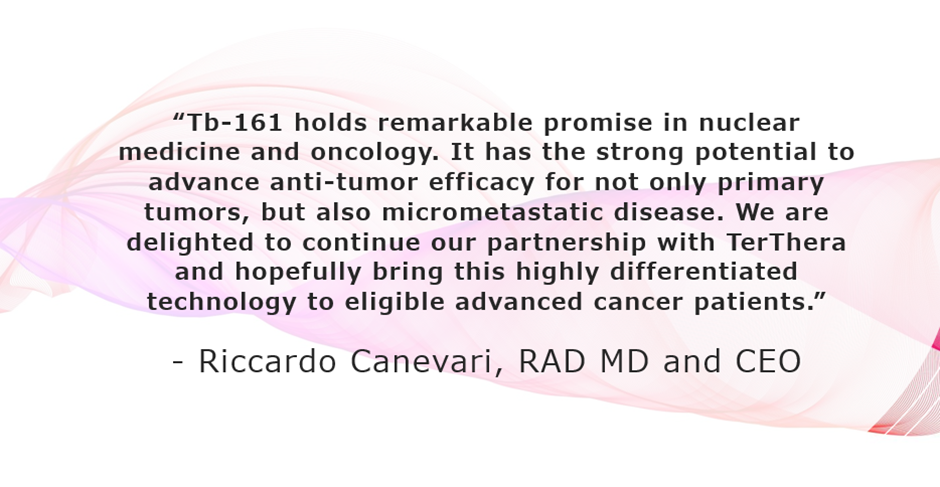Highlights
- Schaefer-Schule et al has published results of a study involving six metastatic castration-resistant prostate cancer patients treated with 161Tb vs 177Lu.
- The study validated RAD’s leadership in advancing Tb-161 radiotherapeutics targeting advanced cancer.
- Partnership with TerThera makes RAD the first public company with access to Tb-161 for the development of multiple programs.
Radiopharm Theranostics Limited (ASX: RAD) has hailed a study indicating Terbium-161 radiotherapeutics as a promising treatment for advanced cancers.
The publication on the results of six metastatic Castration-Resistant Prostate Cancer (mCRPC) patients treated with 161Tb vs 177Lu has been made by Schaefer-Schuler et al.
The publication of first head-to-head pilot study suggests the leadership of RAD in developing first-in-class Terbium-161 (Tb-161) radiotherapeutics for treating prostate cancer.

Tb-161 - a promising candidate for advanced cancers
The findings of the study indicated that in comparison to 177Lu-PSMA-617, 161Tb-PSMA-617 provides significantly higher tumor-absorbed doses. Meanwhile, the absorbed doses of the relevant organs at risk were only marginally higher.
On average, a radiation dose delivered to tumor lesions by 161Tb-PSMA-617 is 2.4 times more than 177Lu-PSMA-617. These results strongly endorse Terbium-161 (Tb-161) as a promising candidate for radiotherapeutic targeting advanced cancer treatment.
About Tb-161

Data source: Company update
Notably, Tb-161 has demonstrated excellent bioequivalence, showcasing a biodistribution comparable to currently employed radiopharmaceuticals. Its potential superiority over Lutetium-177 may be attributed to the Auger effect, enhancing potency and efficacy by selectively eradicating tumor cells while leaving surrounding healthy tissue unaffected to a significant extent.
Robust Pipeline of RAD
The company’s innovative pipeline comprises two radiotherapeutics based on Tb-161 – RAD 402 and 502. RAD 402 targets advanced prostate cancer, while RAD 502 targets osteosarcoma. Tb-161 will be linked to two proprietary monoclonal antibodies for both assets.
In August 2023, the company inked an agreement with TerThera to secure the supply of Tb-161, a relatively scarce isotope. RAD highlighted that it is the first public company across the globe with access to Tb-161 for clinical development of multiple assets (as per the publicly available data).
RAD shares traded at AU$0.059 apiece at the time of writing on 29 February 2024.




